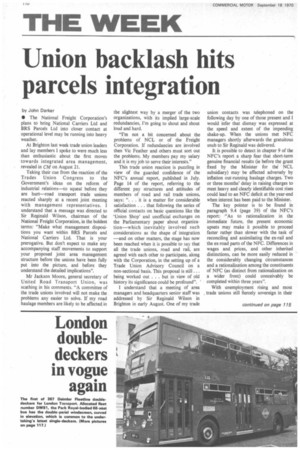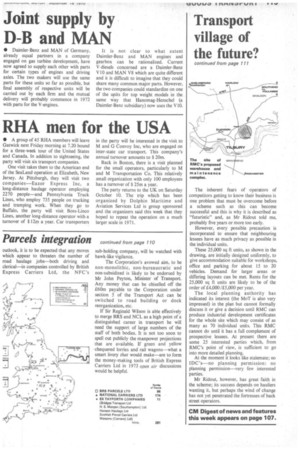Union backlash hits parcels integration
Page 112

Page 117

If you've noticed an error in this article please click here to report it so we can fix it.
by John Darker • The National Freight Corporation's plans to bring National Carriers Ltd and BRS Parcels Ltd into closer contact at operational level may be running into heavy weather.
At Brighton last week trade union leaders and lay members I spoke to were much less than enthusiastic about the first moves towards integrated area management, revealed in CM on August 21.
Taking their cue from the reaction of the Trades Union Congress to the Government's ideas on the reform of industrial relations—to squeal before they are hurt—road transport trade unions reacted sharply at a recent joint meeting with management representatives. I understand that a message was directed to Sir Reginald Wilson, chairman of the National Freight Corporation, in the boldest terms: "Make what management dispositions you want within BRS Parcels and National Carriers Ltd. That is your prerogative. But don't expect to make any accompanying staff movements to support your proposed joint area management Structure before the unions have been fully put into the picture, and before they understand the detailed implications".
Mr Jackson Moore, general secretary of United Road Transport Union, was scathing in his comments. "A committee of the trade unions involved will not make the problems any easier to solve. If my road haulage members are likely to be affected, in the slightest way by a merger of the two organizations, with its implied large-scale redundancies, I'm going to shout and shout loud and hard.
"I'm not a bit concerned about the problems of NCL or of the Freight Corporation. If redundancies are involved then Vic Feather and others must sort out the problems. My members pay my salary and it is my job to serve their interests."
This trade union reaction is puzzling in view of the guarded confidence of the NFC's annual report, published in July. Page 14 of the report, referring to the different pay structures and attitudes of members of road and rail trade unions, says: ". . . it is a matter for considerable satisfaction . . . that following the series of official contacts on basic questions like the 'Union Shop' and unofficial exchanges on the Parliamentary paper about organization—which inevitably involved such considerations as the shape of integration —and on other matters, the stage has now been reached when it is possible to say that all the trade unions, road and rail, are agreed with each other to participate, along with the Corporation, in the setting up of a Trade Union Advisory Council on a non-sectional basis. This proposal is still being worked out . . but in view of old history its significance could be profound". '
I understand that a meeting of area managers and headquarters senior staff was addressed by Sir Reginald Wilson in Brighton in early August. One of my trade union contacts was telephoned on the following day by one of those present and I would infer that dismay was expressed at the speed and extent of the impending shake-up. When the unions met NFC managers shortly afterwards the gratuitous snub to Sir Reginald was delivered.
It is possible to detect in chapter 9 of the NFC's report a sharp fear that short-term genuine financial results (ie before the grant fixed by the Minister for the NCL subsidiary) may be affected adversely by inflation out-running haulage charges. Two or three months' delay in raising charges to meet heavy and clearly identifiable cost rises could lead to an NEC deficit at the year-end when interest has been paid to the Minister.
The key pointer is to be found in paragraph 9.4 (page 39) of the NFC's report: "As to rationalization in the immediate future, the present economic upsets may make it possible to proceed faster rather than slower with the task of reconciling and assimilating the ex-rail and the ex-road parts of the NEC. Differences in wages and prices, and other inherited distinctions, can be more easily reduced in the considerably changing circumstances and a rationalization among the constituents of NFC (as distinct from rationalization on a wider front) could conceivably be completed within three years".
With unemployment rising and most trade unions still fiercely sovereign in their
outlook, it is to be expected that any moves which appear to threaten the number of road haulage jobs—both driving and clerical—in companies controlled by British Express Carriers Ltd, the NFC's sub-holding company, will be watched with hawk-like vigilance.
The Corporation's avowed aim. to be non-monolithic, non-bureaucratic and non-subsidized is likely to be endorsed by Mr John Peyton, Minister of Transport Any money that can be chiselled off the £60m payable to the Corporation under section 5 of the Transport Act can be switched to road building or dock reorganization, etc.
If Sir Reginald Wilson is able effectively to merge BRS and NCL as a high point of a distinguished career in transport he will need the support of large numbers of the staff of both bodies. It is not too soon to spell out publicly the manpower projections that are available. If green and yellow chequered lorries and rail wagons—what a smart livery that would make—are to form the money-making tools of British Express Carriers Ltd in 1973 open air discussions would be helpful.






























































































































































































































































































































































































